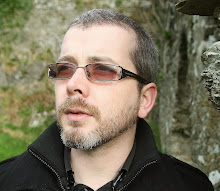I'm still not done with the festivities, and indeed tonight may prove the highlight of a debauched week, but I figured I should post something here, lest one or two people think I've dropped off the face of the blogosphere.
So, just a little heads up. Over the crimbo holidays, I've read and intend to review Everybody Knows This is Nowhere by John McFetridge and I'm neck deep in Adrian McKinty's Fifty Grand. I hope to get stuck into Mystery Man by Colin Bateman next and then I'll be checking out some more Ken Bruen (can't get enough of that guy) and Walking The Perfect Square by Reed Farrel Coleman. I've also got three more David Peace books and... man, this could go on. Basically, I'm spoilt for choice in the new year, so there'll be no shortage of reviews as CSNI continues to grow.
Just for the record, I have a loose priority list with regards to promotion. Writers from the North of Ireland first, followed closely by those from the South. After that, it's kind of up in the air. Anybody who can be tied to Ireland in any way will get whim priority. For instance, McFetridge can trace some of his family back to Larne in Northern Ireland. Reed Farrel Coleman is releasing a book with Ken Bruen this year. I'll probably read Pariah by Dave Zeltserman as it's got Boston Irish gangsters in it. The rest, I'll read for fun, maybe reference it from time to time, but probably not review. I gotta write my own Northern Irish crime fiction too, you know.
So, thanks to everybody who's read, commented and emailed me about the blog. Thanks in general to the crime fiction community for being warm, friendly and cool. Thanks to all the authors I met this year, who ignored my stuttering awe and told me it was nice to meet me. It's been a great year, and I hope the trend continues.
In 2009, aside from reviews, I hope to progress my own writing. If I can't sell a novel, screenplay or stage play, then I'll be chipping away with short stories on the side. But I'm also lucky enough to be involved with a non-fiction project with Declan Burke and Adrian McKinty and a fiction anthology with Mike Stone. Both collections will contain work from some of my favourite writers. It's dizzying to think about it. You'll read plenty of updates on both here.
But for now, give me a few days to recover from an overindulgence of pies and beer and wine and crackers and cheese and whiskey and crisps. Then I'll be a slightly pudgier blogging dynamo bringing you as much news as you can handle, and more besides.
Happy New Year, folks.












